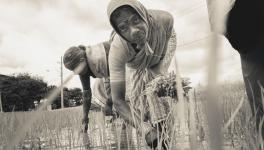COVID-19 in Rural India-V: Poor Households in Kuloth Having to Work as Agri Labour to Survive
Image Representational use only. image Courtesy: Livemint
This is the fifth report in a series that provides glimpses into the impact of COVID-19-related policies on life in rural India. The series, commissioned by the Society for Social and Economic Research, comprises reports by various scholars who have been conducting village studies in different parts of India. The reports have been prepared on the basis of telephonic interviews with key informants in their study villages. This report makes a preliminary assessment of the impact of the nationwide lockdown on the agricultural activities, labour and livelihoods of people in Kuloth village in Jhunjhunu district, Rajasthan based on telephonic conversations with two medium-scale farmers (on March 29, 2020) and one casual worker (on April 6, 2020).
Kuloth is a village of nearly 600 households. The major caste groups in Kuloth include jat (about 300 households), chamar (about 100 households), dhanak (about 50 households), lilgar (between 20-30 households) and baniya (between 20-30 households). In addition, there are a few guwariya (bangle sellers), bhoppa (gypsies), lohar (blacksmiths), nyak, sikka (fabric painting on cotton sheets), kumhar (potmakers) and brahmin households.
The Shekhawati region, of which Jhunjhunu is a part, has a long tradition of people from the artisanal castes migrating to West Asia or to other parts of India to work at skilled artisans and technicians (between 10 and 15 individuals from Kuloth are a present employed in Saudi Arabia, but none of them have returned to the village during the pandemic). Many skilled construction workers and masons from the chamar, lilgar, sikka, guwariya, nyak and kumhar castes also migrate from Kuloth to other villages and cities (mostly in Haryana) in search of work.
Wheat and mustard are the major rabi crops grown in Kuloth. The cultivation of gram (chana) has reduced in the past few years, since gram is susceptible to destruction by unseasonal rains and windstorms.
With the increased availability of tubewell irrigation, farmers in the region have shifted to more reliably profitable crops, such as wheat and mustard. This year, the mustard crop was harvested before the lockdown was imposed. While some farmers have stored the harvested grain in their homes, others have not yet had the opportunity to thresh their harvested crops, which are still lying in their fields. Also, most farmers have not been able to take their mustard harvests to the market to sell.
The wheat crop remains standing in fields as the lockdown has delayed harvesting. Although a few weeks’ postponement will not affect the wheat itself, the delay could create difficulties for small farmers who need the money to subsist on or to repay their debts. Unirrigated plots of land that are not at present under a rabi crop are being prepared by farmers for the sowing of bajra (pearl millet) and cotton, for which they will employ agricultural workers in the village.
Kuloth usually sees an influx of migrant workers from neighbouring districts, Jodhpur, and eastern states like Bihar, Bengal and Uttar Pradesh. However, not many migrant workers have been able to travel to the village this year, and the villagers worry about a potential shortage of labour (and an increase in the cost of hiring labour) during wheat harvesting.
Only one migrant family from Hanumangarh managed to get to Kuloth before the lockdown was announced. This family has been travelling to work here in this season since the past few years, and has found accommodation at the village inn during the lockdown. They continue to work in the fields, and are able to use their wages to buy essential commodities from the village shop.
Agricultural work in Kuloth has not stopped because of the lockdown, but work that was usually done by migrant labour is now being done by local workers. One of the respondents, a casual worker from the kumhar caste, reported that many landless workers from the village had migrated to Haryana in this season as wages for construction work there were higher than those offered for agricultural labour in the village.
However, with the restrictions imposed on movement, local workers are having to work as agricultural labourers within the village to earn enough to subsist on. While some employment in earthwork would have been available in the past through the rural job guarantee scheme, MGNREGA, all activity under this scheme stopped when the lockdown began.
Kuloth’s milk-producing households have seen a drop in demand for milk owing to the imposition of the lockdown. Prior to the lockdown, cow milk was sold in the village for Rs40-50/litre and buffalo milk for Rs 60-70/litre. In addition to being retailed in the village and neighbouring areas, the milk is sold to cooperatives like Amul and SARAS whose agents used to come to collect milk twice a day. Since these agents have not been coming to the village during the lockdown, the weekly cash flow to milk producers in the village, most of whom are women, has stopped. The fall in demand for milk has resulted in a substantial loss of income for these households. For now, dairy farmers are using surplus milk to prepare ghee (clarified butter), which they hope to be able to sell once the lockdown ends.
State officials (tehsildars, SDM, panchayat) perform regular checks at the village level to enforce restrictions, especially on the number of shops that are open. The price of an essential commodity, such as onions, has increased manifold: before the lockdown, a kilo of onions was available for Rs10-12, but the price has increased to RS 30-40/kg after the lockdown. Similarly, the price of potatoes has increased from Rs 15/kg to RS 25/kg. Other vegetables are not available in the market as the supply from Sikar has been disrupted due to the lockdown.
Some medium-scale and large-scale farmers in Kuloth cultivate vegetables, such as spinach, brinjal, okra, coriander, fenugreek, and onion for self-consumption. During the lockdown, only these households have had access to vegetables. Other households have had to make do with dried leaves, fruits and beans gathered from local shrubs and trees (such as teet and sangri), or simply eat chapatis with a dip made of salt and red chilli.
In terms of dealing with the spread of the COVID-19 disease, a team comprising the tehsildar, a nurse and an anganwadi worker have been doing the rounds to identify people with symptoms. They have also been recording the travel histories of people in the village. People with a history of recent travel have been told to inform the officials if any symptoms of COVID-19 appear. They have also been told strictly to not travel anywhere for the next 14-15 days.
Anyone who has travelled to other states has been asked to practice self-isolation and a poster stating this is mounted outside their house. About 25 families are currently self-isolating. One of the respondents interviewed for this report was self-isolating because he had travelled from Assam. The respondent’s household had stocked up on food and other necessities, and the respondent was staying in a separate room in the house, and considered isolation to be a precautionary measure.
Access to basic facilities in the village is limited due to the lockdown. There is no bank in the village and villagers need to travel 15km to Surajgarh to withdraw cash. In absence of cash, cash transactions are being avoided by either resorting to barter or obtaining essential commodities on credit.
Access to medical facilities is also a major concern for people. There are no medical facilities or doctors in the village, and the inhabitants usually travel to Chirawa, Surajgarh or Loharu to avail medical facilities. Although there has been no health emergency so far, if the need arises, no transport would be available because of the lockdown. Anganwadis have also been closed since the lockdown began and midday meals are not being provided.
To sum up, poor and landless households in Kuloth have been the worst affected by the lockdown. Unable to migrate to seek other forms of employment, agricultural labour is the only source of employment left to them. Livestock rearing (specifically of milch animals) is an important source of livelihood for women in Kuloth, and the disruption to milk procurement by cooperative dairies has resulted in a loss of income for them. Access to basic services—health facilities, anganwadi, mid-day meals, transport and market—has been severely disrupted. Issues resulting from these disruptions are likely to arise if the lockdown continues.
The writer is a Research Scholar in the Centre for Media Studies, Jawaharlal Nehru University, Delhi.
Get the latest reports & analysis with people's perspective on Protests, movements & deep analytical videos, discussions of the current affairs in your Telegram app. Subscribe to NewsClick's Telegram channel & get Real-Time updates on stories, as they get published on our website.
























